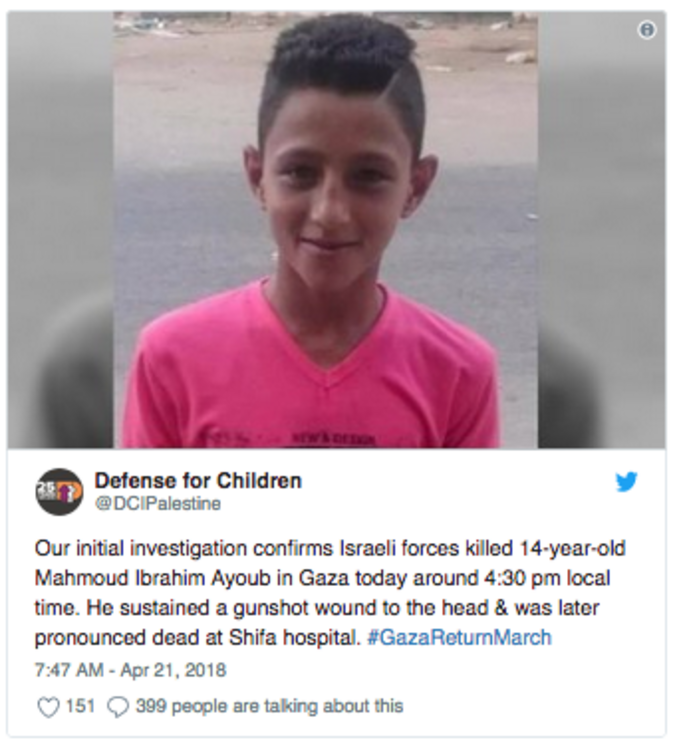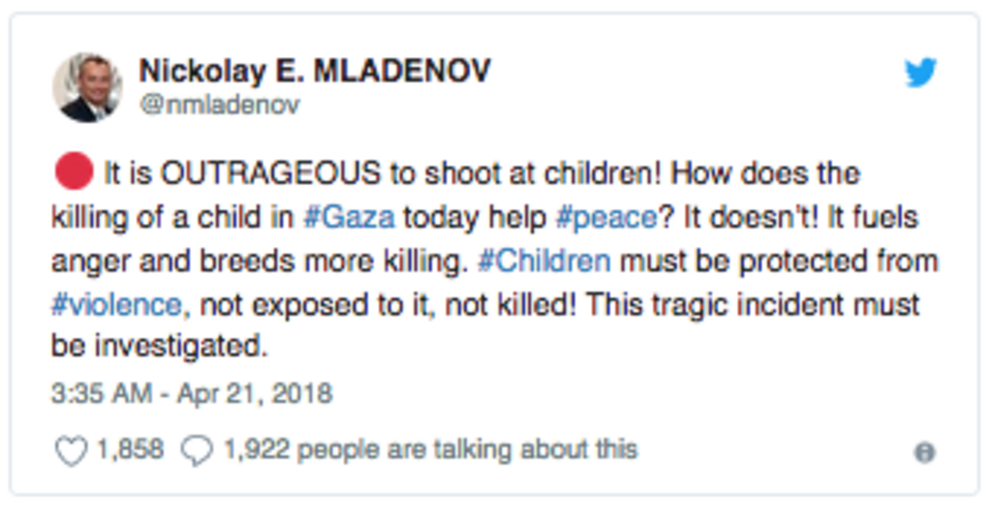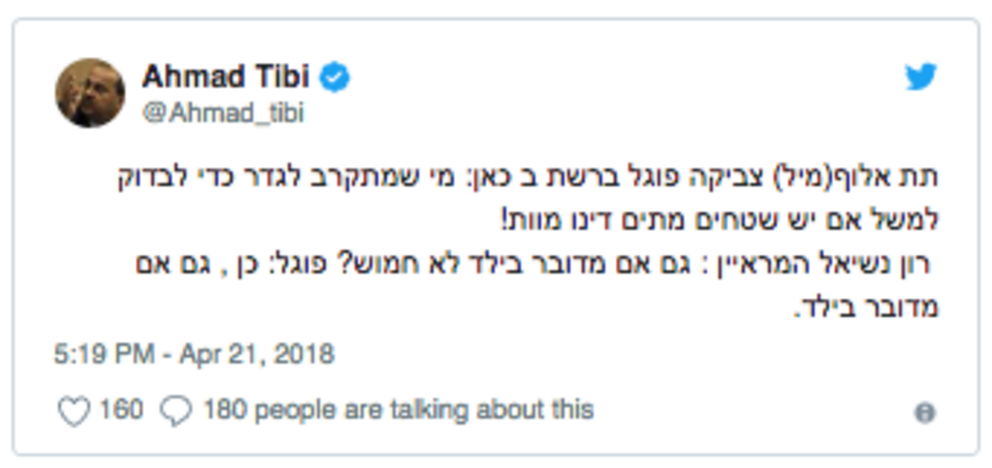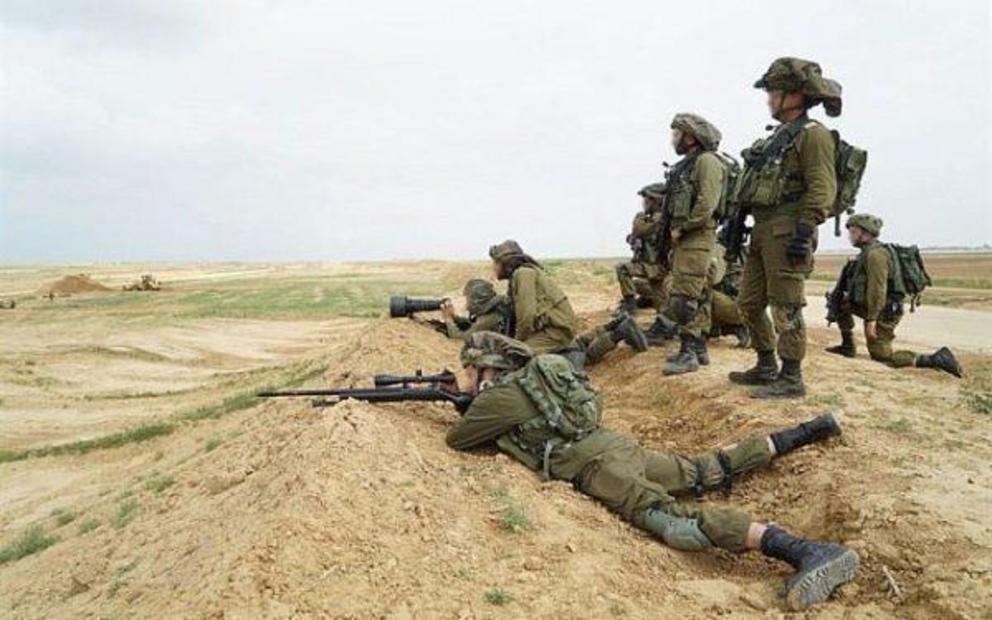IDF snipers ordered to shoot Palestinian children
... Israeli General confirms
GR Editor’s Note
Lets be clear as to implications.
When they ” shoot at children, they are doing so deliberately, under clear and specific orders.”
What this means is that the Netanyahu government ordered the killing of children. The guidelines adopted by the IDF were approved at the highest levels of the Israeli government.
We are dealing with crimes against humanity and the self-proclaimed “international community” applauds. Western leaders, not to mention the media, are complicit: the consensus is that “Israel has the right to defend itself” …. by killing children.
Through omission, the Western media does not mention the words “Gaza Massacre”. You won’t see it. The Palestinians are described as “terrorists”. The lie become the truth!
Michel Chossudovsky, Global Research, May 19, 2018
* * *
An Israeli general has confirmed that when snipers stationed along Israel’s boundary with Gaza shoot at children, they are doing so deliberately, under clear and specific orders.
In a radio interview, Brigadier-General (Reserve) Zvika Fogel describes how a sniper identifies the “small body” of a child and is given authorization to shoot.
Fogel’s statements could be used as evidence of intent if Israeli leaders are ever tried for war crimes at the International Criminal Court.
On Friday, an Israeli sniper shot dead 14-year-old Muhammad Ibrahim Ayyoub.
The boy, shot in the head east of Jabaliya, was the fourth child among the more than 30 Palestinians killed during the Great March of Return rallies that began in Gaza on 30 March.
More than 1,600 other Palestinians have been shot with live ammunition that has caused what doctors are calling “horrific injuries” likely to leave many of them with permanent disabilities.

As eyewitnesses and video confirmed, the child Muhammad Ayyoub posed no conceivable danger to heavily armed Israeli occupation forces stationed dozens of meters away behind fences and earthen fortifications on the other side of the Gaza boundary when he was killed.
Even the usually timid United Nations peace process envoy Nickolay Mladenov publicly declared that the slaying was “outrageous.”

Targeting children
On Saturday, Brigadier-General Fogel was interviewed by Ron Nesiel on the Israeli public radio network Kan.
Fogel is the former chief of staff of the Israeli army’s “southern command,” which includes the occupied Gaza Strip.

Ahmad Tibi, a Palestinian lawmaker in Israel’s parliament, drew attention to the interview in a tweet.
A recording of the interview is online (it begins at 6:52). The interview was translated for The Electronic Intifada by Dena Shunra and a full transcript follows this article.
The host Ron Nesiel asks Fogel if the Israeli army should “rethink its use of snipers,” and suggests that someone giving orders “lowered the bar for using live fire.”
Fogel adamantly defends the policy, stating:
“At the tactical level, any person who gets close to the fence, anyone who could be a future threat to the border of the State of Israel and its residents, should bear a price for that violation.”
He adds:
“If this child or anyone else gets close to the fence in order to hide an explosive device or check if there are any dead zones there or to cut the fence so someone could infiltrate the territory of the State of Israel to kill us …”
“Then his punishment is death?” Nesiel interjects.
“His punishment is death,” the general responds. “As far as I’m concerned then yes, if you can only shoot him to stop him, in the leg or arm – great. But if it’s more than that then, yes, you want to check with me whose blood is thicker, ours or theirs.”
Fogel then describes the careful process by which targets – including children – are identified and shot:
“I know how these orders are given. I know how a sniper does the shooting. I know how many authorizations he needs before he receives an authorization to open fire. It is not the whim of one or the other sniper who identifies the small body of a child now and decides he’ll shoot. Someone marks the target for him very well and tells him exactly why one has to shoot and what the threat is from that individual. And to my great sorrow, sometimes when you shoot at a small body and you intended to hit his arm or shoulder, it goes even higher.”
For “it goes even higher,” Fogel uses a Hebrew idiom also meaning “it costs even more.”
In this chilling statement, in which a general talks about snipers targeting the “small body of a child,” Fogel makes crystal clear that this policy is premeditated and deliberate.
While presenting unarmed Palestinian children as dangerous terrorists worthy of death, Fogel describes the snipers killing them in cold blood as the innocent, vulnerable parties who deserve protection.
“We have soldiers there, our children, who were sent out and receive very accurate instructions about whom to shoot to protect us. Let’s back them up,” he says.
Lethal policy
Fogel’s statements are no aberration but represent Israeli policy.
“Israeli officials made it clear that the open-fire regulations would permit lethal fire at anyone attempting to damage the fence, and even at any person coming within 300 meters of it,” the Israeli human rights group B’Tselem stated in a recent analysis of Israel’s illegal targeting of unarmed civilians who pose no threat.
“Nevertheless, all state and military officials have steadfastly refused to cancel the unlawful orders and continue to issue – and justify – them,” B’Tselem added.
B’Tselem has called on individual soldiers to defy such illegal orders.
Following its investigation of the “calculated” killings of unarmed demonstrators on 30 March, the first day of the Great March of Return rallies in Gaza, Human Rights Watch concluded that the lethal crackdown was “planned at [the] highest levels of the Israeli government.”
Two weeks ago, the chief prosecutor of the International Criminal Court issued an unprecedented warning that Israeli leaders may face trial for the killings of unarmed Palestinian protesters in the Gaza Strip.
Potential defendants would be giving any prosecutor a gift with such open admissions that killing unarmed people in an occupied territory who pose no objective threat is their policy and intent.
The question remains whether anything will finally pierce the shield of impunity that Israel has enjoyed for 70 years.
* * *
Full Transcript
Brigadier-General (Res.) Zvika Fogel interviewed on the Yoman Hashevua program of Israel’s Kan radio, 21 April 2018.
Ron Nesiel: Greetings Brigadier General (Res.) Zvika Fogel. Should the IDF [Israeli army] rethink its use of snipers? There’s the impression that maybe someone lowered the bar for using live fire, and this may be the result?
Zvika Fogel: Ron, let’s maybe look at this matter on three levels. At the tactical level that we all love dealing with, the local one, also at the level of values, and with your permission, we will also rise up to the strategic level. At the tactical level, any person who gets close to the fence, anyone who could be a future threat to the border of the State of Israel and its residents, should bear a price for that violation. If this child or anyone else gets close to the fence in order to hide an explosive device or check if there are any dead zones there or to cut the fence so someone could infiltrate the territory of the State of Israel to kill us …
Nesiel: Then, then his punishment is death?
Fogel: His punishment is death. As far as I’m concerned then yes, if you can only shoot him to stop him, in the leg or arm – great. But if it’s more than that then, yes, you want to check with me whose blood is thicker, ours or theirs. It is clear to you that if one such person will manage to cross the fence or hide an explosive device there …
Nesiel: But we were taught that live fire is only used when the soldiers face immediate danger.
Fogel: Come, let’s move over to the level of values. Assuming that we understood the tactical level, as we cannot tolerate a crossing of our border or a violation of our border, let’s proceed to the level of values. I am not Ahmad Tibi, I am Zvika Fogel. I know how these orders are given. I know how a sniper does the shooting. I know how many authorizations he needs before he receives an authorization to open fire. It is not the whim of one or the other sniper who identifies the small body of a child now and decides he’ll shoot. Someone marks the target for him very well and tells him exactly why one has to shoot and what the threat is from that individual. And to my great sorrow, sometimes when you shoot at a small body and you intended to hit his arm or shoulder it goes even higher. The picture is not a pretty picture. But if that’s the price that we have to pay to preserve the safety and quality of life of the residents of the State of Israel, then that’s the price. But now, with your permission, let us go up one level and look at the overview. It is clear to you that Hamas is fighting for consciousness at the moment. It is clear to you and to me …
Nesiel: Is it hard for them to do? Aren’t we providing them with sufficient ammunition in this battle?
Fogel: We’re providing them but …
Nesiel: Because it does not do all that well for us, those pictures that are distributed around the world.
Fogel: Look, Ron, we’re even terrible at it. There’s nothing to be done, David always looks better against Goliath. And in this case, we are the Goliath. Not the David. That is entirely clear to me. But let’s look at it at the strategic level: you and I and a large part of the listeners are clear that this will not end up in demonstrations. It is clear to us that Hamas can’t continue to tolerate the fact that its rockets are not managing to hurt us, its tunnels are eroding …
Nesiel: Yes.
Fogel: And it doesn’t have too many suicide bombers who continue to believe the fairytale about the virgins waiting up there. It will drag us into a war. I do not want to be on the side that gets dragged. I want to be on the side that initiates things. I do not want to wait for the moment where it finds a weak spot and attacks me there. If tomorrow morning it gets into a military base or a kibbutz and kills people there and takes prisoners of war or hostages, call it as you like, we’re in a whole new script. I want the leaders of Hamas to wake up tomorrow morning and for the last time in their life see the smiling faces of the IDF. That’s what I want to have happen. But we are dragged along. So we’re putting snipers up because we want to preserve the values we were educated by. We can’t always take a single picture and put it before the whole world. We have soldiers there, our children, who were sent out and receive very accurate instructions about whom to shoot to protect us. Let’s back them up.
Nesiel: Brigadier-General (Res.) Zvika Fogel, formerly Head of the Southern Command Staff, thank you for your words.
Fogel: May you only hear good news. Thank you.
The original source of this article is Friends of Syria
Copyright © Zvika Fogel and Ron Nesiel, Friends of Syria, 2018

